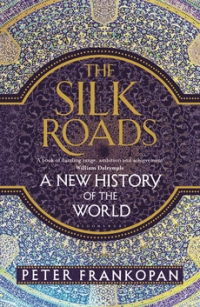Frankopan delivers Stavros Niarchos Foundation Lecture
The early 1990s were a magical time for Western nations. The Berlin Wall fell; the Soviet Union broke up peacefully into 15 constituent republics; Nelson Mandela walked free; and the First Gulf War came to an end. The world seemed peaceful, united, and happy. The fight among warring ideologies had ended, and liberal democracies had prevailed.
Peter Frankopan, a historian from the University of Oxford and author of The Silk Roads: A New History of the World, announced that today’s world is far removed from the calm following the Cold War.
Professor Frankopan, the keynote speaker for the Stavros Niarchos Foundation Lecture sponsored by the Hellenic Studies Program at the MacMillan Center, pulled up a map marking major conflict areas around the world. The pins, shaped like small, orange explosions, dotted parts of Africa and East Asia, but most rested in the area between the Middle East and western China, along the old Silk Road.
“These countries, from Turkey to China have common denominators, such as royal courts, limited press freedom, low tolerance of ethnic or religious minorities,” he explained.
These eastern nations are the antithesis of liberal democracies and the locus of global conflict, yet most academics ignore them and continue to only study the West. In fact, 93% of history professors in at Oxford University specialize in either the United States or Western Europe.
Professor Frankopan believes the disengagement with a non-western past is a problem.
“How many people can name a current Arab pop singer or an Indian film star or a Russian contemporary novelist or a Chinese philosopher from the 20th century?” he asked the audience.
He did admit that his focus on the East was serendipitous. He stumbled upon the Byzantine world as a student at Cambridge and was immediately enthralled by it. The encounter with Byzantium opened up for him a new world of peoples and empires, from Asia Minor all the way to China, traditionally ignored by Western academia.
Professor Frankopan confessed that he is not the first to be captivated by the Silk Road countries. Alexander the Great knew that prestige and opportunity resided in Asia. The Roman Emperor Constantine even built a new capital in what is now Istanbul to bring the Roman Empire – as Professor Frankopan put it – “closer to the action.”
“The Middle East was the greatest prize in human history,” Professor Frankopan explained. “It was where our ancestors first learned to cultivate wheat, where all religions sprung from. It was the cauldron where things happened” – and where things still happen.
Professor Frankopan closed his lecture by drawing attention to the New Silk Road, a powerful and profitable East, mired in conflict, that once again nervously piques the interest of Western leaders.
The New Silk Road, however, will attempt to develop free of modern-day Alexander the Greats or Emperor Constantines. That is to say, today’s East will reject Western influence and intervention.
According to Professor Frankopan, the only way to manage relationships with the New Silk Road is to study the old one:
“To understand the past and the present, it is not sufficient to follow the ways of yesterday, if you want to understand how today will look you have to adapt. It starts with teaching the parts of the world that don’t often get airtime.”
This year’s Stavros Niarchos Foundation Lecture in Hellenic Studies, established in 2004 in honor of the Program’s sponsors, was given on September 12. The Program had been funded by the Stavros Niarchos Foundation as a pilot program from 2001 to 2007. In 2007 the Board of Directors of the Foundation endowed the Stavros Niarchos Foundation Center for Hellenic Studies at Yale University, which funds activities of the Hellenic Studies Program at the Whitney and Betty MacMillan Center for International and Area Studies at Yale University. The lecture series brings to the Yale campus distinguished scholars in the humanities and social sciences, public figures, and artists of international reputation.
